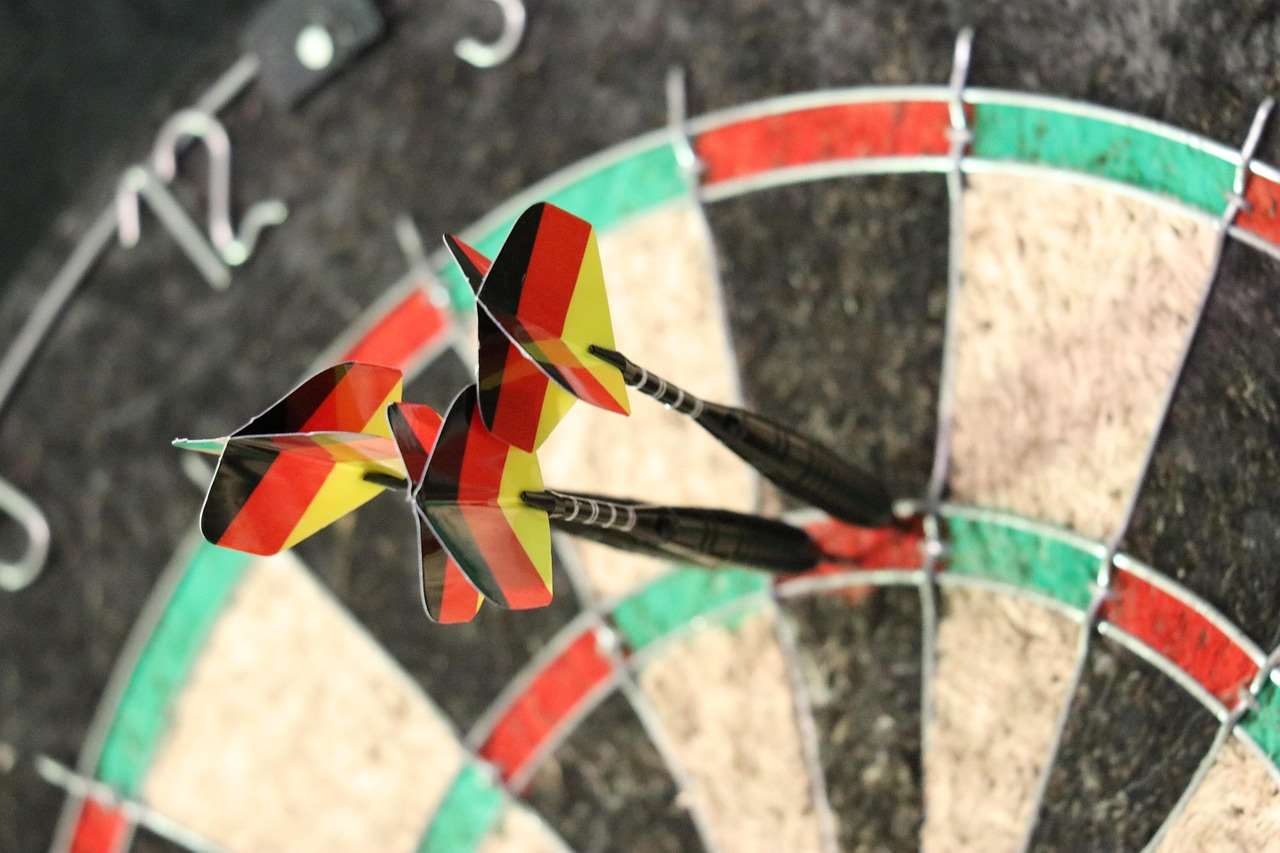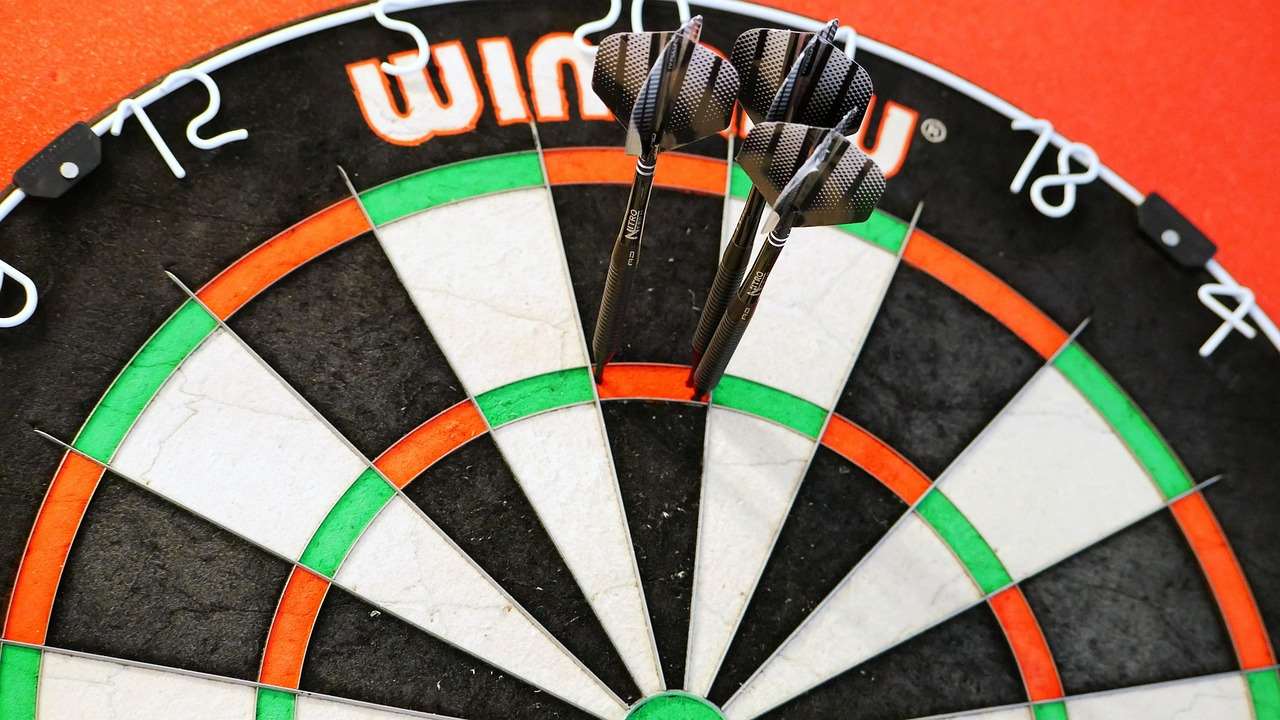To master Cricket darts, you need a solid **Cricket darts offensive strategy: maximizing points**, which means prioritizing key numbers to open and close effectively while disrupting your opponent’s scoring. This article delves into the nuances of offensive strategy in Cricket darts, covering number selection, scoring tactics, defensive maneuvers, and psychological warfare to help you dominate the board.
⚠️ Still Using Pen & Paper (or a Chalkboard)?! ⚠️
Step into the future! The Dart Counter App handles all the scoring, suggests checkouts, and tracks your stats automatically. It's easier than you think!
Try the Smart Dart Counter App FREE!Ready for an upgrade? Click above!
Understanding the Core Principles of a Winning Cricket Darts Offensive Strategy
The game of Cricket in darts isn’t just about hitting any number. A well-defined Cricket darts offensive strategy: maximizing points hinges on understanding which numbers to target, when to target them, and how to manipulate the game to your advantage. It’s a dynamic balance of opening your own numbers, closing your opponent’s, and strategically scoring points when the opportunity arises. Before diving deeper, you may find it useful to review Basic Darts Fundamentals for Beginners.
Key Numbers to Prioritize in Cricket
- 20: The highest single number on the board, making it the prime target for racking up points quickly once you’ve opened it.
- 19: Another high-scoring number that provides a strong alternative to 20 and can be used to create scoring opportunities.
- 18: Often overlooked, 18 can be valuable for setting up doubles or triples and is a solid choice when other numbers are blocked.
- 17: Can be used to control the center of the board.
- 16: A common choice and readily available, especially when other options are limited.
- Bullseye: While challenging, the bullseye offers quick closure and can be a psychological advantage.
Opening Numbers Effectively
Opening a number requires hitting it three times. Consider these tactical approaches:
- Consistency is Key: Focus on hitting the same number repeatedly to open it quickly.
- Spread Your Darts: If your first dart misses, adjust slightly rather than throwing all three darts to the same spot.
- Use Doubles Wisely: Don’t hesitate to use doubles or triples to open a number if it presents itself. A double followed by a single will also open the number.

Developing a Scoring Mindset
Once you’ve opened a number, the real scoring begins. The goal is to pile up points quickly before your opponent can close the number.
Maximizing Point Potential
The simplest way to describe Cricket darts offensive strategy: maximizing points after opening is focusing on **triples and doubles**. Triples will earn you 3x the number value each throw.
- Aim for Triples: Practice your triple accuracy on your open numbers.
- Utilize Doubles: Doubles can be strategically used when triples are risky, or to set up future scoring opportunities.
- Consider the Score: Always be aware of your score and your opponent’s score. Adjust your strategy based on the lead you have or the deficit you need to overcome.
When to Stop Scoring
Knowing when to stop scoring on a number is just as important as knowing when to start. Don’t overscore when the opponent is approaching the mark and close the number at the appropriate time.
- Close Before Your Opponent Does: If your opponent is close to opening or closing a number you’re scoring on, prioritize closing it to deny them points.
- Don’t Overscore: If you have a substantial lead, focus on closing numbers rather than accumulating unnecessary points.
- Be Mindful of Busts: Avoid exceeding the point total needed to win. This is especially crucial in the later stages of the game.
Defensive Tactics: Disrupting Your Opponent
A strong defense is crucial in Cricket. Preventing your opponent from scoring or opening numbers is a key element of a successful Cricket darts offensive strategy: maximizing points.
Closing Opponent’s Numbers
Closing a number that your opponent has opened can completely swing the momentum of the game.
- Prioritize High-Value Numbers: If your opponent has opened 20 or 19, make it a priority to close them as quickly as possible.
- Use Doubles Strategically: Doubles are a very efficient way of closing.
Blocking Strategies
Sometimes, preventing your opponent from hitting a specific number is more effective than trying to score yourself.
- Strategic Placement: Position your darts to physically block your opponent’s access to a desired number.
- Mental Intimidation: Even the *attempt* to block can create doubt and force your opponent into mistakes.

The Psychological Game
Cricket darts is not just a physical game; it’s also a mental one. Using psychological tactics can give you a significant edge.
Reading Your Opponent
Pay attention to your opponent’s body language, throwing patterns, and reactions to your throws. Understanding their tendencies can help you anticipate their moves and exploit their weaknesses. You might also be interested in Adapting darts rules for beginners.
Applying Pressure
There are several ways to apply psychological pressure to your opponent:
- Consistent Scoring: Maintain a steady scoring pace to keep your opponent on edge.
- Quick Closures: Closing numbers quickly can create a sense of urgency and force your opponent to rush their throws.
- Strategic Pauses: Taking a deliberate pause before throwing can disrupt your opponent’s rhythm.
Staying Composed
Maintaining composure under pressure is essential. Don’t let your emotions get the best of you, and always focus on the next dart.
Advanced Strategies for Maximizing Points
Once you’ve mastered the basics, you can incorporate more advanced strategies to elevate your Cricket darts offensive strategy: maximizing points.
Calculating Probabilities
Assess your chances of hitting a specific number based on your skill level and the current board layout. Choose the option that offers the highest probability of success. Many people also find it useful to review Simplified 501 game rules for novice players.
Number Sequencing
Plan your number selection in advance based on the current game state. Consider which numbers are most likely to be open, which numbers your opponent is targeting, and which numbers offer the highest scoring potential. Remember to keep your eye on the bullseye for a potential quick close.

Adapting to Your Opponent’s Style
Adjust your strategy based on your opponent’s playing style. If they are aggressive scorers, focus on defense and closing numbers. If they are more cautious, take the initiative and apply pressure. There are other games besides Cricket, see if any fun dart game variations with modified rules peak your interest.
- Aggressive Players: Focus on closing their numbers and disrupting their scoring rhythm.
- Defensive Players: Take the initiative and apply pressure by consistently scoring and opening numbers.
Practicing Your Cricket Darts Offensive Strategy
No strategy is effective without dedicated practice. Here are some drills to improve your Cricket skills:
Number-Specific Drills
- Target Practice: Focus on hitting specific numbers repeatedly, aiming for triples and doubles.
- Opening Drills: Practice opening numbers quickly and efficiently.
- Closing Drills: Practice closing numbers under pressure.
Game Simulation Drills
- Simulated Games: Play practice games against yourself or a friend, focusing on implementing your offensive strategy.
- Scenario Drills: Create specific game scenarios and practice making the best decisions in each situation.

Common Mistakes to Avoid
Even experienced players can fall victim to common mistakes. Avoiding these pitfalls can significantly improve your performance.
Ignoring the Score
Always be aware of the score and how many points you need to win. Miscalculating can lead to costly errors.
Overscoring
Accumulating unnecessary points can leave you vulnerable to a bust and give your opponent an opportunity to catch up.
Failing to Adapt
Sticking to a rigid strategy without adjusting to the changing game state can be detrimental.
Neglecting Defense
Focusing solely on offense without considering defense can leave you vulnerable to your opponent’s scoring.
The Future of Cricket Darts Strategy
As the game of Cricket evolves, so too will the strategies required to succeed. Expect to see increasing emphasis on data analysis, advanced statistical models, and psychological techniques. Keeping up with these trends will be crucial for staying ahead of the competition and maintaining a winning Cricket darts offensive strategy: maximizing points.

Conclusion: Mastering the Art of Offense in Cricket Darts
Developing a robust Cricket darts offensive strategy: maximizing points is essential for success. By understanding the core principles, prioritizing key numbers, mastering scoring tactics, employing defensive maneuvers, and leveraging psychological warfare, you can significantly improve your chances of dominating the board. Remember to practice consistently, adapt to your opponent’s style, and stay mentally focused throughout the game.
Take what you’ve learned here, hit the dartboard, and start implementing these strategies. Your journey to becoming a Cricket darts champion begins now!
Hi, I’m Dieter, and I created Dartcounter (Dartcounterapp.com). My motivation wasn’t being a darts expert – quite the opposite! When I first started playing, I loved the game but found keeping accurate scores and tracking stats difficult and distracting.
I figured I couldn’t be the only one struggling with this. So, I decided to build a solution: an easy-to-use application that everyone, no matter their experience level, could use to manage scoring effortlessly.
My goal for Dartcounter was simple: let the app handle the numbers – the scoring, the averages, the stats, even checkout suggestions – so players could focus purely on their throw and enjoying the game. It began as a way to solve my own beginner’s problem, and I’m thrilled it has grown into a helpful tool for the wider darts community.